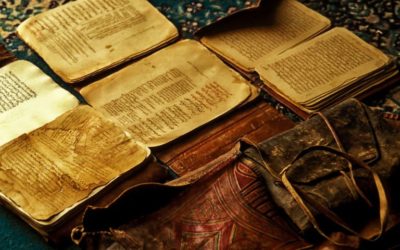In the reign of Umar b. al-Khaṭṭāb, a man came to him with his son. Upon seeing the two, ʿUmar (r), the caliph, was amazed at the resemblance between the two. The man said, “He was born while his mother was dead!” Skeptical, ʿUmar (r) replied, “Woe to you! Report to me how this could occur?”
The man reported: “Some time ago, I was called to battle. While I was boding farewell to my pregnant wife, she said to me, ‘How can you leave me alone while I’m pregnant?!’ To this I replied, ‘I leave what is in your womb under Allah’s protection,’ and left. When I returned, I saw the door of my house locked. I inquired and learned that my wife had passed away. I then went to her grave in al-Baqīʿ and cried. When night fell, I went there again and met someone who said that every night he saw a fire coming from one of the graves, and it happened that it was from my wife’s grave. Upon that, I said, ‘She was a fasting, praying, pious Muslim woman!’ Then I took a shovel and unearthed her grave, and to my surprise, I saw her sitting there with my son crawling beside her. Then someone called out, ‘O you who asked Allah for protection, take that for which you asked Allah for protection. If you had also asked Him to protect your wife, you would have found her again too.’ Thus, I took my son and closed the grave again. This is the story, O leader of the believers.”
This story is transmitted by al-Ṭabarāni in al-Duʿāʾ no. 824, al-Kharaiṭi in Makārim al-Akhlāq no. 753, Ibn Abi al-Dunya in Man ʿāsha baʿd al-Mawt no. 25, and in Mujābu al-daʿwa no. 47 via the following chain of narrators:
Ubaid b. Isḥāq al-ʿAṭṭār -> ʿĀṣim b. Muḥammad -> Zayd b. Aslam ->from his father
This narration is a fabrication as the narrator ʿUbaid b. Isḥāq was highly criticized by many hadith scholars:
- Imām al-Bukhāri said regarding him, “munkar al-ḥadith.” This expression is used by al-Bukhāri to make it clear that nothing from this narrator is authentic or accepted.[1]
- Isḥāq b. Manṣūr said about him, “I testify before Allah that Muḥammad b. Ḥumayd and ʿUbaid b. Isḥāq are liars.”[2]
- Ibn Maʿīn said, “He is nothing.”[3]
Moreover, the content of the narration is also strange and is an indication of its weakness:
- The narrated event is said to have taken place in al-Baqīʿ. Fire is said to have come out of the woman’s tomb every night, whereas only one narrator, and a very weak one at that, is said to have noticed it. If the narration was indeed authentic, its contents would have spread much faster.
- If the child had been born in the tomb, it would have needed milk to drink. However, the deceased mother would not have been able to provide it. No doubt, Allah is capable of anything, but there are already enough authentic stories in the Quran and Sunnah that point to Allah’s omnipotence.
The hadith scholars say that if there is something wrong with the content of a narration, it is due to a mistake mostly made by a weak narrator. This fact is also evident in this narration. The hadith scholars are also of the opinion that it is not permissible to tell such stories without pointing out that they are very weak or fabricated stories.
[1] Cf. al-Tārīkh al-Ṣaghīr, vol. 2, p. 334.
[2] Tārīkh al-Baghdād, vol. 2, p. 263
[3] al-Jarḥ wa al-Taʿdīl, vol. 4, p. 401



